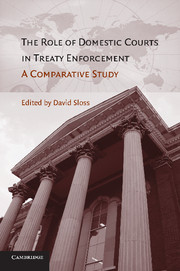Book contents
- Frontmatter
- Contents
- Contributors
- Preface
- Acknowledgments
- 1 Treaty Enforcement in Domestic Courts: A Comparative Analysis
- 2 Does International Law Obligate States to Open Their National Courts to Persons for the Invocation of Treaty Norms That Protect or Benefit Persons?
- 3 Australia
- 4 Canada
- 5 Germany
- 6 India
- 7 Israel
- 8 The Netherlands
- 9 Poland
- 10 Russian Federation
- 11 South Africa
- 12 United Kingdom
- 13 United States
- 14 The Role of Domestic Courts in Treaty Enforcement: Summary and Conclusions
- Index
- References
8 - The Netherlands
Published online by Cambridge University Press: 06 January 2010
- Frontmatter
- Contents
- Contributors
- Preface
- Acknowledgments
- 1 Treaty Enforcement in Domestic Courts: A Comparative Analysis
- 2 Does International Law Obligate States to Open Their National Courts to Persons for the Invocation of Treaty Norms That Protect or Benefit Persons?
- 3 Australia
- 4 Canada
- 5 Germany
- 6 India
- 7 Israel
- 8 The Netherlands
- 9 Poland
- 10 Russian Federation
- 11 South Africa
- 12 United Kingdom
- 13 United States
- 14 The Role of Domestic Courts in Treaty Enforcement: Summary and Conclusions
- Index
- References
Summary
INTRODUCTION
This chapter discusses the application of treaties in the domestic legal order of the Kingdom of the Netherlands. The term treaties is used here, in accordance with the definition that is used officially in the Netherlands, to refer to any agreement, irrespective of its name or form, that binds the Netherlands under international law. I use the term application in a broad sense to cover supplementary legal or material action taken by the Netherlands in its domestic legal order to ensure the full effect of a given provision of a treaty. Application also covers judicial rulings (whether by administrative or judicial bodies) that give effect to a treaty provision in a particular case. The term application thus includes performance, as that term is used in the Vienna Convention on the Law of Treaties.
This chapter demonstrates that the Netherlands is very open to the application of international law in its domestic legal order. However, it also shows that, like most or perhaps all other states, the Netherlands resorts to evasion strategies that may insulate the domestic legal order from the consequences of international legal obligations that are not considered sufficiently transparent or legitimate, that may conflict with existing law, or that may collide with political interests of the Netherlands.
The chapter starts by discussing some aspects of treaty making in the Netherlands that are relevant to the subsequent phase of application of treaties (Section II).
- Type
- Chapter
- Information
- The Role of Domestic Courts in Treaty EnforcementA Comparative Study, pp. 326 - 369Publisher: Cambridge University PressPrint publication year: 2009
References
- 6
- Cited by

